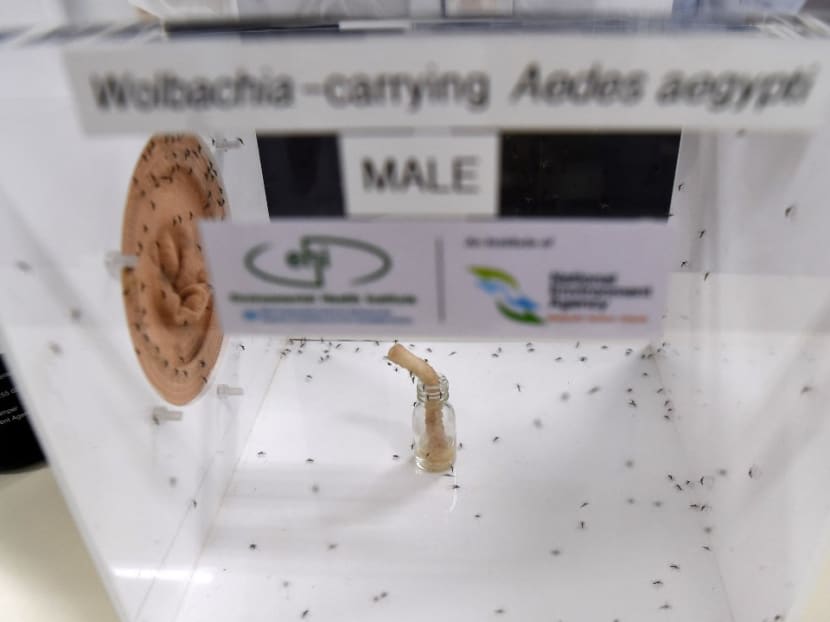Citing some challenges, experts say too soon to call if expanded Project Wolbachia will defeat rising dengue scourge

- Experts said it is too soon to make a call on whether an expansion of Project Wolbachia would succeed in bringing Singapore's dengue scourge under control
- On Wednesday (June 15), the NEA said the mosquito-suppressing project would be expanded to cover nearly a third of HDB flats
- Experts told TODAY that while earlier studies produced promising results, they want to see numbers from the latest expansion before passing judgement on its likely success
- They noted, for example, that even with the expansion, "normal" mosquitoes could still contaminate the areas under Wolbachia coverage
SINGAPORE — Experts believe it is premature to assess whether a marked expansion of the mosquito-suppressing Project Wolbachia will succeed in dealing with the dengue scourge that has hit Singapore with renewed intensity this year, despite positive signs in trials so far.
The National Environment Agency (NEA) said on Wednesday (June 15) that Project Wolbachia will cover another 1,400 blocks of Housing and Development Board (HDB) flats, taking the total coverage to 31 per cent of HDB blocks or 300,000 homes.
More than 14,000 dengue cases have been reported so far this year, more than double the 5,258 cases reported last year. The Government has warned that weekly case numbers could surpass the record 1,800 seen in 2020.
Experts noted that although NEA has observed success at some Wolbachia sites, such as those in Tampines and Yishun, challenging factors remain and the project should be evaluated only after seeing the numbers following the latest expansion.
They said that "normal" mosquitoes from non-Wolbachia areas could still contaminate the expanded areas of coverage, and queried whether the expansion, to be rolled out from July, would come in time to curb this year's case numbers.
Community surveillance and mosquito removal also needs to continue, they added.
Associate Professor Koh Tieh Yong, a weather and climate scientist at the Singapore University of Social Sciences, told TODAY that the successful reduction of dengue cases in the study areas is “already quite an achievement”.
He pointed to the country's equatorial climate that favours mosquito breeding, as well as the high levels of population density here.
“Both factors make mosquito-transmitted diseases like dengue almost impossible to eradicate.”
Referring to the use of Wolbachia mosquitoes to block out dengue in parts of northern Queensland in Australia, Professor Paul Tambyah, president of the Asia Pacific Society of Clinical Microbiology and Infection, believes that it is reasonable to try to repeat that success story in urban Singapore.
Still, he noted that many more travellers enter Singapore compared with northern Queensland, and that the situation here is more complicated.
The Queensland project centred on the towns of Cairns and Townsville, with populations of 150,000 and 180,000 respectively.
“Our high population density together with the high rate of movement of vehicles and products, which can contain mosquito breeding sites, means that it is very hard to prevent the entry of 'normal' mosquito eggs, larvae and mosquitoes into areas where Wolbachia mosquitoes are released,” Prof Tambyah said.
If the Wolbachia mosquitoes replaced the “normal” mosquitoes, dengue case numbers will go down, but if there is too much “contamination” of the Wolbachia areas by “normal” mosquitoes, there will be no impact on the dengue numbers.
“It would be good to see the dengue numbers after this expanded release of the Wolbachia mosquitoes… It is very challenging but if it works and we can eliminate dengue the way they did in northern Queensland it will be very remarkable.Professor Paul Tambyah, president of the Asia Pacific Society of Clinical Microbiology and Infection”
“It would be good to see the dengue numbers after this expanded release of the Wolbachia mosquitoes… It is very challenging but if it works and we can eliminate dengue the way they did in northern Queensland, it will be very remarkable,” he added.
Speaking to TODAY, Dr Leong Hoe Nam, an infectious diseases expert at Rophi Clinic, said that he was expecting good results from the project, as seen in other countries, and called for full Wolbachia coverage of all homes in Singapore.
“Instead of evaluating the project at its infancy... We ought to double down on the mosquito production numbers, to achieve 100 per cent coverage of all homes,” he added.
Piloted in 2016, Project Wolbachia involves releasing at chosen sites male Aedes aegypti mosquitoes that are intentionally infected with the parasitic microbe Wolbachia. These male The male mosquitoes do not bite.
Eggs laid by female mosquitoes that mate with these Wolbachia-Aedes males will be sterile and will not hatch because they are biologically incompatible, thus reducing the population numbers for these mosquitoes.
Wolbachia is a naturally occurring bacterium found in several insect species, but not in the Aedes aegypti mosquito.
NEA said that it has previously observed a 98 per cent reduction in the dengue mosquito population and up to 88 per cent reduction of dengue cases at sites in Tampines and Yishun, where more than one year of mosquito releases have been conducted.
“Similar observations have been made in the current dengue outbreak where these areas have 70 per cent less dengue cases compared to similar areas without Wolbachia,” the agency added.
NEA said on Wednesday that Wolbachia-Aedes male mosquitoes will be released at eight new locations: Bedok North, Bedok Reservoir, Chua Chu Kang (Yew Tee), Geylang, Hougang, Punggol, Sengkang and Woodlands.
Releases will also take place at selected construction sites and non-residential sites in dengue high-risk areas.
To support the expansion of this project, the Government will be ramping up its production of male Wolbachia-Aedes mosquitoes from two million a week now to five million by the end of year.
NOT A SILVER BULLET
Even though the outcomes of the various trials so far have yielded some positive results, experts have remained cautious on Project Wolbachia’s success at controlling the current dengue scourge.
Professor Duane Gubler, chairman of the Dengue Expert Advisory Panel and Emeritus Professor at Duke-NUS Medical School, said that studies have shown promise, but Project Wolbachia alone will not be enough to control the dengue situation in Singapore.
“The exciting results suggest that if Wolbachia technology is properly implemented alongside surveillance and community-based removal of Aedes mosquito breeding habitats, Singapore could potentially be the first dengue endemic country in the world to effectively control this epidemic disease,” he said.
Another expert, Associate Professor Alex Cook, vice-dean of research at Saw Swee Hock School of Public Health, said: “Wolbachia releases do not drive the mosquito population to complete oblivion.
"Some residual breeding with wild males persists, which is why it remains important to continue to be vigilant even in neighbourhoods that have Wolbachia releases.”
Ms Grace Fu, Minister for Sustainability and the Environment, already cautioned on Wednesday at the fifth Asia Dengue Summit held here, that the Wolbachia technology is not a “silver bullet” to control the disease.
Ms Fu said studies have shown that the impact of Wolbachia technology is maximised when coupled with existing community efforts and vector control operations to suppress the presence of breeding habitats.
Speaking to TODAY, Assoc Prof Cook said that approaches such as Wolbachia are needed since dengue control is getting tougher because of falling population immunity — meaning that a single infected mosquito can infect substantially more people today compared to a decade ago.
“Being able to expand coverage to a third of public housing estates will make a difference, though it’s unclear whether this will be in time for the current outbreak,” he added.








